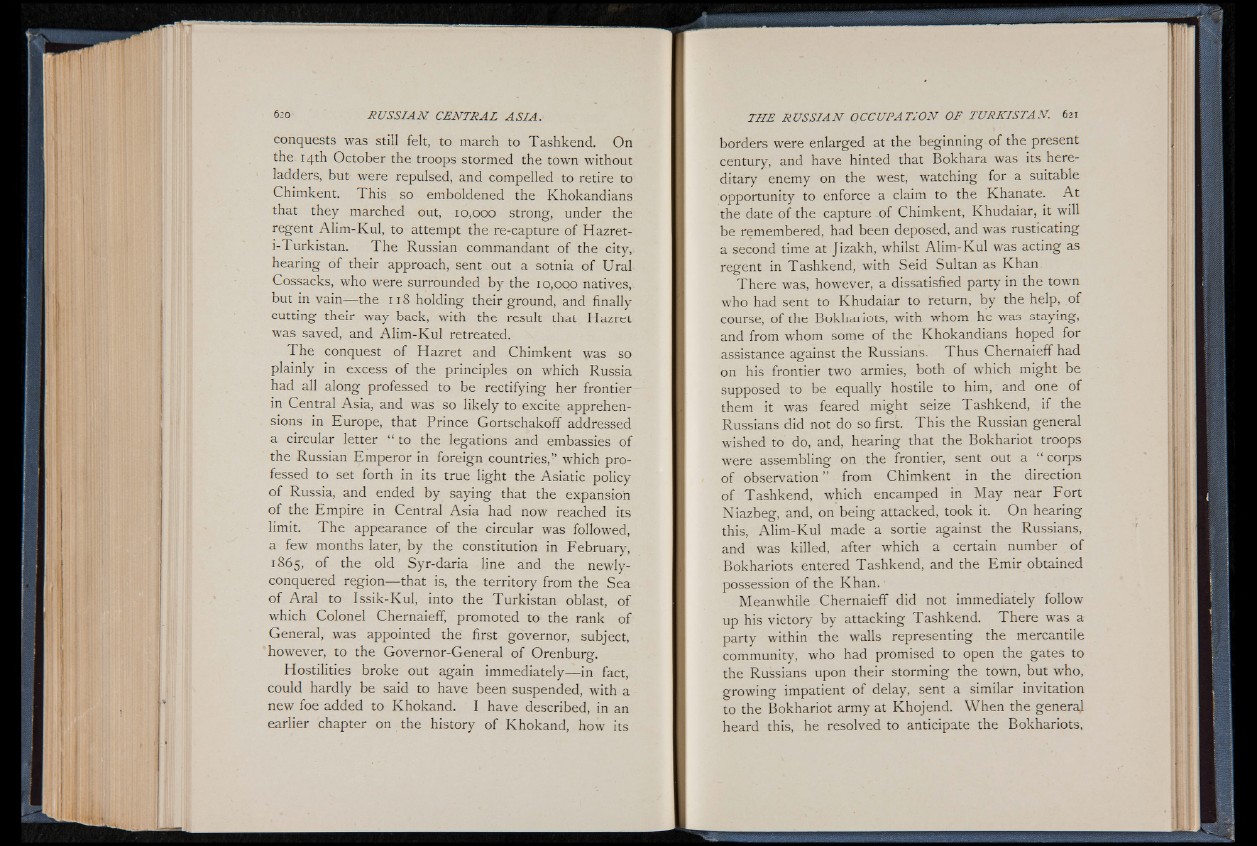
conquests was still felt, to march to Tashkend. On
the 14th October the troops stormed the town without
ladders, but were repulsed, and compelled to retire to
Chimkent. This so emboldened the Khokandians
that they marched out, 10,000 strong, under the
regent Alim-Kul, to attempt the re-capture of Hazret-
i-Turkistan. The Russian commandant of the city,
hearing of their approach, sent out a sotnia of Ural
Cossacks, who were surrounded by the 10,000 natives,
but in vain-— the 118 holding their ground, and finally
cutting their way back, with the result that Hazret
was saved, and Alim-Kul retreated.
The conquest of Hazret and Chimkent was so
plainly in excess of the principles on which Russia
had all along professed to be rectifying her frontier
in Central Asia, and was so likely to excite apprehensions
in Europe, that Prince Gortschakoff addressed
a circular letter “ to the legations and embassies of
the Russian Emperor in foreign countries,’-’ which professed
to set forth in its true light the Asiatic policy
of Russia, and ended by saying that the expansion
of the Empire in Central Asia had now reached its
limit. The appearance of the circular was followed,
a few months later, by the constitution in February,
1865, of the old Syr-daria line and the newly-
conquered region— that is, the territory from the Sea
of Aral to Issik-Kul, into the Turkistan oblast, of
which Colonel Chernaieff, promoted to the rank of
General, was appointed the first governor, subject,
however, to the Governor-General of Orenburg.
Hostilities broke out again immediately— in fact,
could hardly be said to have been suspended, with a
new foe added to Khokand. I have described, in an
earlier chapter on the history of Khokand, how its
borders were enlarged at the beginning of the present
century, and have hinted that Bokhara was its hereditary
enemy on the west, watching for a suitable
opportunity to enforce a claim to the Khanate. A t
the date of the capture of Chimkent, Khudaiar, it will
be remembered, had been deposed, and was rusticating
a second time at Jizakh, whilst Alim-Kul was acting as
regent in Tashkend, with Seid Sultan as Khan.
There was, however, a dissatisfied party in the town
who had sent to Khudaiar to return, by the help, of
course, of the Bokhariots, with whom he was staying,
and from whom some of the Khokandians hoped for
assistance against the Russians. Thus Chernaieff had
on his frontier two armies, both of which might be
supposed to be equally hostile to him, and one of
them it was feared might seize Tashkend, if the
Russians did not do so first. This the Russian general
wished to do, and, hearing that the Bokhariot troops
were assembling on the frontier, sent out a “ corps
of observation ” from Chimkent in the direction
of Tashkend, which encamped in May near Fort
Niazbeg, and, on being attacked, took it. On hearing
this, Alim-Kul made a sortie against the Russians,
and was killed, after which a certain number of
Bokhariots entered Tashkend, and the Emir obtained
possession of the Khan.
Meanwhile,Chernaieff did not immediately follow
up his victory by attacking Tashkend. There was a
party within the walls representing the mercantile
community, who had promised to open the gates to
the Russians upon their storming the town, but who,
growing impatient of delay, sent a similar invitation
to the Bokhariot army at Khojend. When the genera)
heard this, he resolved to anticipate the Bokhariots,